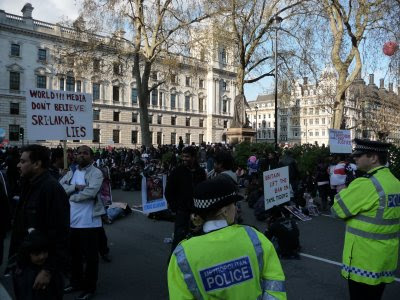It seems every time I go see an exhibition the past few days, I run into a Tamil protest. This time it was the Altermodern triennial at Tate Britain (of which I will write more later), and my Tamil friends were staging a sit-in at Parliament Square. I shot some more photos, but concentrated mostly on video footage this time, which I have edited into a short film, posted above through Youtube. (I shot in high-definition, but unfortunately it has gone through various conversions for upload...hm. something to work on. I am quite fond of the last shot, with the Churchill statue looming over the crowd as the clock of Westminster Cathedral stikes seven.)
These protests have been going on for several days and have blocked streets in central London, the one on Saturday drawing a crowd of 100,000 according to official police figures; yet it has hardly made the headlines. (Partly explainable by the Sri Lankan government's ban on foreign journalists.)
One key thing to note is that although Tamil communities worldwide have been staging protests and sit-ins, there is an added significance here. Unsurprisingly, the root of the conflict in Sri Lanka is one of many British colonial leftovers - the creation by Crown mandate, on the departure of the British from Sri Lanka (formerly known as Ceylon), of an artificial statelet - without regard to pre-existing regional demographic differences and related claims to autonomy, in this case the Tamil minority who were left in a repressive majority-Sinhalese statelet.
I am tempted to come up with a jibe here on the likelihood that all this had something to do with preserving the supply - and of course the impeccable flavour - of English tea.
It also strikes me that almost any existing armed conflict in the world today, now, that I can think of is rooted in some mess left by European colonialists - usually British - upon their departure; and in almost every single case, the root cause is a cynical disregard of demographic, political, and ethnic differences in carving out artificial statelets, power usually being doled out to the most loyal or cooperative of colonial subjects. Palestine, Pakistan, Iraq, Iran, Afghanistan, East Timor, Somalia, Ethiopia, you name it - case after case, the map of armed conflict in the world today is almost invariably a series of variations on a theme.
Just look at a map of Africa - look at all those perfectly straight lines. I mean, sure, desert and savanna is pretty straightforward territory if you're drawing borders. But who drew them? Do you think they largely reflect the migratory patterns of Bedouin tribes, or the whims of colonial prelates of yore?

And then they blame the mess in the world on the genetic proclivity of 'darker races' to engage in violence. (I have personally witnessed a member of the liberal British upper classes - a Guardian-reading, public school-educated PhD student in urban development at UCL - quietly elaborate this point to me once on a bus chock-full of local immigrants in Dalston, in relation both to the causes of the high crime rate in Hackney and the violence in the world in general; it was one of my first cultural shocks in Britain, and I shall never forget my initial disbelief that he was indeed suggesting - indeed, in a very British, understated manner - what I was indeed hearing...)
To be fair, the British certainly aren't the only ones to blame, and one should also take into account places like Vietnam and Korea - the product of a similar colonial bug, albeit of a more modern, Soviet-American-Franco-Chinese variety. (interestingly enough, both countries were split between a communist north and a pro-Western south, in both cases reflecting no known actual demographic divisions, but rather the balance of power between the occupying forces.)
And yet it seems to me that almost all the key hotspots brewing right now - Palestine, Iraq, Sri Lanka - can be traced back to British colonial rule. Sure, it's complicated. Sure, there is a situation on the ground and there is no simple solution - not anymore at least. But is it just that the British are unlucky, and happened to take on the most difficult places with the most complicated histories under their domain, or is it that there is something particularly cynical about their methods of colonial government? An example much closer to home - Ireland - might be instructive, since it poses similar dilemmas and complications.
The British government's way of washing its hands clean of the mess in Sri Lanka at present is to dismiss the Tamil Tigers, as other governments have, following Sri Lanka's cue, as a terrorist organization. The best indication of the cynicism of such policies, in light of what is known about the conflict, is the double standard applied by the USA and other governments to the kurds, as documented in the film Good Kurds, Bad Kurds : the Iraqi Kurds, who are useful, are treated as 'freedom fighters'; the Turkish Kurds, who are essentially part of the same movement, have the same goals and deploy the same methods, are 'terrorists', because Turkey is an ally.
It is for this reason that the Tamil protesters' slogans include 'Tigers are our freedom fighters'.
In light of all this, it is commendable that they still wave the British flag at their protests, instead of burning it, as I surely would in their shoes.
Monday, 13 April 2009
Tamil sit-in at Parliament Square and the Bug of Colonial Cynicism
Subscribe to:
Post Comments (Atom)




No comments:
Post a Comment